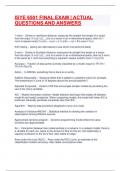ISYE 6501 FINAL EXAM | ACTUAL
QUESTIONS AND ANSWERS
1-norm - Similar to rectilinear distance; measures the straight-line length of a vector
from the origin. If z=(z1,z2,...,zm) is a vector in an m-dimensional space, then it's 1-
norm is square root(|𝑧1|+|𝑧2|+⋯+|𝑧𝑚| = |𝑧1|+|𝑧2|+⋯+|𝑧| = Σm over i=1 |𝑧𝑖|
A/B Testing - testing two alternatives to see which one performs better
2-norm - Similar to Euclidian distance; measures the straight-line length of a vector
from the origin. If z=(z1,z2,...,zm) is a vector in an 𝑚-dimensional space, then its 2-norm
is the same as 1-norm but everything is squared= square root(Σm over i=1 (|𝑧𝑖|)^2)
Accuracy - Fraction of data points correctly classified by a model; equal to TP+TN /
TP+FP+TN+FN
Action - In ARENA, something that is done to an entity.
Additive Seasonality - Seasonal effect that is added to a baseline value (for example,
"the temperature in June is 10 degrees above the annual baseline").
Adjusted R-squared - Variant of R2 that encourages simpler models by penalizing the
use of too many variables.
AIC - Akaike information criterion- Model selection technique that trades off between
model fit and model complexity. When comparing models, the model with lower AIC is
preferred. Generally penalizes complexity less than BIC.
Algorithm - Step-by-step procedure designed to carry out a task.
Analysis of Variance/ANOVA - Statistical method for dividing the variation in
observations among different sources.
Approximate dynamic program - Dynamic programming model where the value
functions are approximated.
Arc - Connection between two nodes/vertices in a network. In a network model, there is
a variable for each arc, equal to the amount of flow on the arc, and (optionally) a
capacity constraint on the arc's flow. Also called an edge.
Area under the curve (AUC) - Area under the ROC curve; an estimate of the
classification model's accuracy. Also called concordance index.
,ARIMA - Autoregressive integrated moving average.
Arrival Rate - Expected number of arrivals of people, things, etc. per unit time -- for
example, the expected number of truck deliveries per hour to a warehouse.
Assignment Problem - Network optimization model with two sets of nodes, that finds
the best way to assign each node in one set to each node in the other set.
Attribute - A characteristic or measurement - for example, a person's height or the color
of a car. Generally interchangeable with "feature", and often with "covariate" or
"predictor". In the standard tabular format, a column of data.
Autoregression - Regression technique using past values of time series data as
predictors of future values.
Autoregressive integrated moving average (ARIMA) - Time series model that uses
differences between observations when data is nonstationary. Also called Box-Jenkins.
Backward elimination - Variable selection process that starts with all variables and then
iteratively removes the least-immediately-relevant variables from the model.
Balanced Design - Set of combinations of factor values across multiple factors, that has
the same number of runs for all combinations of levels of one or more factors.
Balking - An entity arrives to the queue, sees the size of the line (or some other
attribute), and decides to leave the system.
Bayes' theorem/Bayes' rule - Fundamental rule of conditional probability:
𝑃(𝐴|𝐵)=𝑃(𝐵|𝐴)*𝑃(𝐴) / 𝑃(𝐵)
Bayesian Information criterion (BIC) - Model selection technique that trades off model
fit and model complexity. When comparing models, the model with lower BIC is
preferred. Generally penalizes complexity more than AIC.
Bayesian Regression - Regression model that incorporates estimates of how
coefficients and error are distributed.
Bellman's Equation - Equation used in dynamic programming that ensures optimality of
a solution.
Bernoulli Distribution - Discrete probability distribution where the outcome is binary,
either 0 or 1. Often, 1 represents success and 0 represents failure. The probability of
the outcome being 1 is 𝑝 and the probability of outcome being 0 is 𝑞 = 1−𝑝, where 𝑝 is
between 0 and 1.
, Bias - Systematic difference between a true parameter of a population and its estimate.
Binary Data - Data that can take only two different values (true/false, 0/1, black/white,
on/off, etc.)
Binary integer program - Integer program where all variables are binary variables.
Binary Variable - Variable that can take just two values: 0 and 1.
Binomial Distribution - Discrete probability distribution for the exact number of
successes, k, out of a total of n iid Bernoulli trials, each with probability p: Pr(𝑘)= (n over
k) p^k(1-p)^n-k
Blocking - Factor introduced to an experimental design that interacts with the effect of
the factors to be studied. The effect of the factors is studied within the same level
(block) of the blocking factor.
box and whisker plot - Graphical representation data showing the middle range of data
(the "box"), reasonable ranges of variability ("whiskers"), and points (possible outliers)
outside those ranges.
Box-Cox Transformation - Transformation of a non-normally-distributed response to a
normal distribution.
Branching - Splitting a set of data into two or more subsets, to each be analyzed
separately.
CART - Classification and regression trees.
Categorical Data - Data that classifies observations without quantitative meaning (for
example, colors of cars) or where quantitative amounts are categorized (for example,
"0-10, 11-20, ...").
Causation - Relationship in which one thing makes another happen (i.e., one thing
causes another).
Chance Constraint - A probability-based constraint. For example, a standard linear
constraint might be 𝐴x≤𝑏. A similar chance constraint might be Pr (𝐴x≤𝑏)≥0.95
Change Detection - Identifying when a significant change has taken place in a process.
Classification - The separation of data into two or more categories, or (a point's
classification) the category a data point is put into.
Classification tree - Tree-based method for classification. After branching to split the
data, each subset is analyzed with its own classification model.




